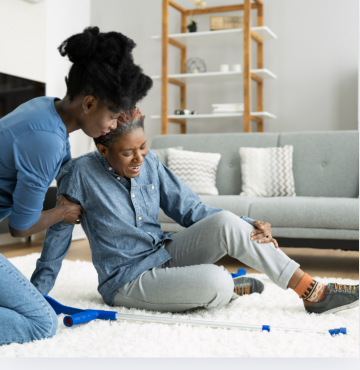
Ensuring their safety and well-being becomes a top priority as our loved ones age. For many families, providing at-home care allows older adults to age in place comfortably. However, creating a safe home environment requires thoughtful planning, proactive measures, and diligent oversight to minimize the risk of elder abuse. Elder abuse can take many forms—physical, emotional, financial, or even neglect—and in an in-home care setting, it’s essential to be vigilant and establish safeguards.
Let’s explore critical strategies such as home modifications, caregiver training, and hiring reputable caregivers to help create a secure and nurturing environment for your elderly loved ones.
Home Modifications: Enhancing Safety to Prevent Accidents and Neglect
A safe home environment starts with identifying and addressing potential hazards. Simple yet impactful home modifications can significantly reduce the likelihood of accidents, ensuring that caregivers can attend to your loved one’s needs without risking neglect or injury.
Here are some essential home modifications to consider:
- Eliminating Fall Risks: Ensure that high-traffic areas like hallways, bathrooms, and stairs are well-lit, clutter-free, and equipped with non-slip mats or flooring. Installing grab bars in bathrooms near the toilet and in the shower or tub provides additional support and stability.
- Securing Entryways and Exits: Equip doors and windows with secure locks, and consider installing security cameras or monitoring systems if needed. These measures can provide peace of mind and prevent unwanted intrusions or wandering.
- Accessibility Features: Install ramps, widen doorways, or lower countertops to improve accessibility for individuals with mobility challenges. Adequate accessibility can help seniors maintain independence while minimizing stress on caregivers.
- Emergency Preparedness: Keep first aid kits, medical alert systems, and emergency contact information readily available. Train caregivers and family members to respond swiftly in case of medical or safety emergencies.
Caregiver Training: Equipping Caregivers with Essential Skills
One of the most effective ways to prevent elder abuse is through proper caregiver training. When caregivers are well-prepared and informed, they are better equipped to handle challenging situations, recognize warning signs of abuse, and provide quality care. Here’s what good caregiver training should include:
- Recognizing Signs of Abuse and Neglect: Caregivers should be educated about the different types of abuse and how to recognize red flags. Knowing what to look for—such as unexplained injuries, changes in behavior, or signs of financial exploitation—empowers caregivers to take swift action.
- Conflict Resolution and Communication Skills: Tensions can sometimes arise between caregivers and the elderly, mainly if cognitive issues are involved. Training caregivers in de-escalation techniques, patience, and effective communication is crucial to preventing conflicts from escalating into abusive situations.
- Personal Care and Mobility Assistance: Proper training in assisting with personal care tasks, transferring patients safely, and using mobility aids can help caregivers perform their duties without causing unintentional harm or neglect due to a lack of skill
The Importance of Hiring Caregivers Through a Reputable Agency
Finding the right caregiver is one of the most crucial steps in creating a safe home environment. While hiring caregivers independently based on a referral or online advertisement might be tempting, doing so carries significant risks. Here’s why working with a reputable agency is essential:
- Rigorous Screening and Background Checks: Reputable agencies perform comprehensive background checks, including criminal history, previous employment verification, and reference checks. This ensures that caregivers with a history of misconduct or criminal activity are not employed to care for your loved one.
- Ongoing Training and Supervision: Trusted agencies provide ongoing training and professional development for their caregivers. Additionally, they supervise caregivers and offer accountability, ensuring that standards of care are consistently maintained.
- Liability Protection: Caregivers hired independently may not be covered under liability insurance, meaning families could face legal and financial ramifications if an incident occurs. Agencies provide the necessary coverage and support in case of accidents or disputes.
Risks of Hiring Caregivers Independently
While hiring caregivers on your own might seem more cost-effective or convenient, it presents several risks:
- Lack of Accountability: Without the oversight of an agency, it can be challenging to monitor the caregiver’s performance, address grievances, or enforce standards of care.
- Inadequate Screening: Families may need more resources or expertise to perform thorough background checks, increasing the risk of hiring someone unqualified or potentially abusive.
- Legal and Financial Risks: If a caregiver gets injured on the job or engages in financial exploitation, the family may have limited recourse or legal protection
Safety Measures to Establish a Trustworthy Caregiving Environment
In addition to home modifications and hiring reputable caregivers, there are a few more essential measures to keep in mind:
- Establish Clear Care Guidelines: Outline specific expectations for the caregiver, including schedules, medication management, dietary restrictions, and preferred communication styles. Regular check-ins can help ensure that these guidelines are being followed.
- Use Technology to Monitor and Communicate: Consider installing cameras or using remote monitoring technology to oversee caregiver interactions if needed. Video calls or family communication apps can also help maintain transparency and open communication with your elderly loved one.
- Foster Open Communication and Build Relationships: Encourage your elderly family member to freely express concerns, fears, or discomforts. Building a trusting relationship between the senior, caregiver, and family creates a safer and more nurturing environment.
Creating a safe home environment to prevent elder abuse requires thoughtful planning, diligent monitoring, and collaboration between families and professionals. By making essential home modifications, equipping caregivers with the proper training, and choosing reputable caregivers through an established agency, you can significantly minimize the risk of elder abuse in an at-home care setting.
Hope Senior Home Care can provide peace of mind, knowing that caregivers are carefully screened, well-trained, and supported by a professional network. By taking these precautions, you are taking proactive steps toward protecting your loved ones and ensuring they receive the respectful, compassionate care they deserve.

